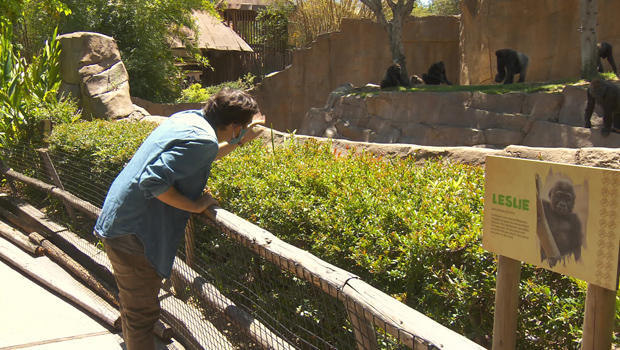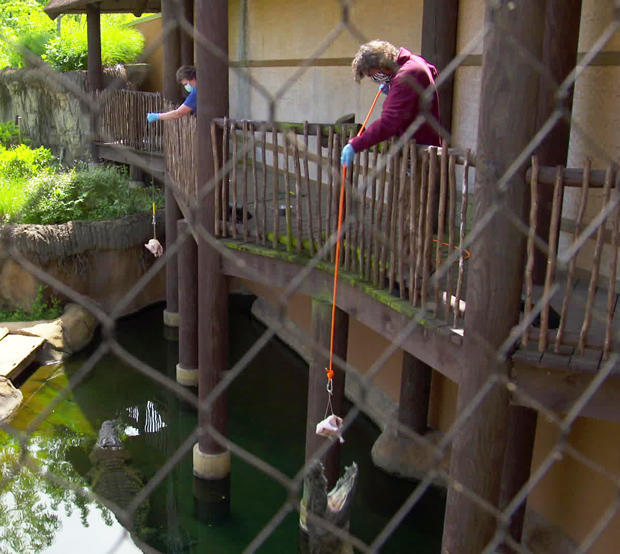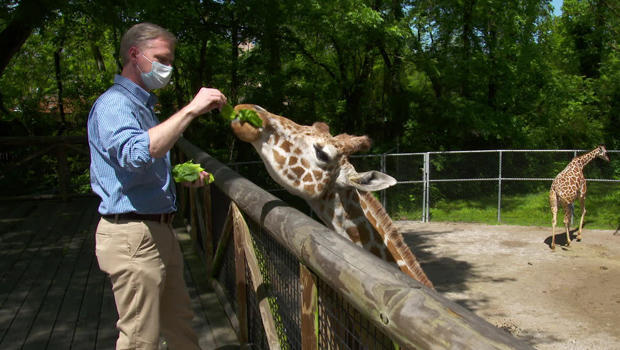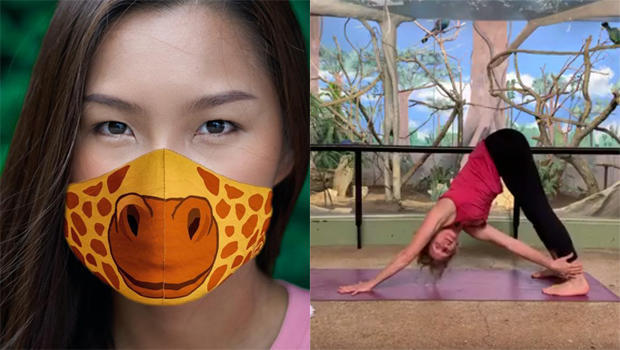Walking around the deserted San Diego Zoo and Safari Park, correspondent Conor Knighton felt like he was the one on display. From the giraffes to the gorillas, the animals were paying him quite a bit of extra attention. After all, they hadn't seen human tourists since mid-March.
"This is a typically high season for us, with lots of guests coming through; really it's incredible to see it without guests right now," said Paul Baribault, the CEO of San Diego Zoo Global, the non-profit that manages San Diego's 1,800-acre Safari Park and 100-acre Zoo, the most visited zoo in the entire country. Both locations closed to the public on March 16.
Baribault said the zoo, which has been in operation for more than a century, has never experienced a closure of this magnitude before: "The most the San Diego Zoo has ever been closed is a single day, and that's only happened five days in the organization's history," he said.
In the midst of historic COVID-related closures happening across the country, zoos face a special set of challenges. Shut a bookstore down and the books inside are fine. But when a zoo closes, what happens to all of the animals?
"Nothing is being skipped, nothing is being changed," said wildlife care specialist Bree Barney. "Their day is going to be the same."
Barney is in charge of San Diego's kangaroos. While the zoo has furloughed ticket-takers and concession-stand workers, employees involved with animal care have been deemed "essential."
Barney's work continues as usual, with a few small modifications – she now wears a mask when hanging out with the marsupials, who may not now recognize her.
"They look at you potentially a little bit differently," she laughed. "Sometimes you'll kind of get the kangaroo, the wallaby, to kind of cock their head a little like, 'Who are you. and what are you doing?'"
Once news broke that lions and tigers at the Bronx Zoo had caught COVID-19 from a staff member, procedures changed at zoos across the country. Now, mealtime means mask time.
But of course, all of that food is expensive. And with everything from the "Zootique" to the "Roar Store" currently closed, zoos are hemorrhaging money.
"The minute the front gate closed, unfortunately we stopped making money," said Matt Thompson, the chief zoological officer at the Memphis Zoo. "And our expenses really didn't change. The animals still have to be cared for."
The Memphis Zoo has a much smaller budget, and smaller financial safety net, than San Diego's. Thompson said, "March through June is when we make 60% of our revenue, so recovering from this honestly is going to be very, very difficult."
With the expense of ongoing animal care, Thompson is predicting a $10 million loss for the year. And yet, the zoo has still managed to sign up some new members, even at a time when members can't visit.
The Memphis Zoo has been churning out hours of educational content to keep fans engaged, such as a virtual encounter with Crookshanks, a ball python:
And also some less educational content: In their popular "Zoolympics" videos, they've capitalized on the current lack of sports programing, and have been awarding medals in everything from the Tortoise 100 Meter Sprint ("Blazing start for Lil Dab, who was extremely quick in the East Africa time trials!") to the Pelican Fish Catch ("Radar gets the gold with five fish, Clinger, the silver with 3, Henry with 2, the bronze!").
Zoos have had to get creative with their programming. The Florida Aquarium has launched a series of "Sea Span" videos with a behind-the-scenes look at operations:
The Denver Zoo invited fans to vote on the name of its new baby Rhino (for a small donation, of course). "Joona" ultimately won out.
Back in San Diego, spring births are in full swing. "Life at the zoo continues," said Baribault. "We continue to have births."
Newborn penguin chicks are learning to swim. An Andean bear cub is taking its first steps. For the animals, this is a year just like any other year.
But since normal visitation still looks to be a long way off, San Diego's Congressional representatives have written a letter to Speaker Nancy Pelosi asking to direct a billion dollars of funding to the Institute of Museum and Library Services that would help keep zoos across the country afloat.
In the meantime, empty parking lots have been serving a new purpose. From Pittsburgh to Knoxville to the Bronx, zoos have become COVID-19 testing locations for humans.
For more info:
Story produced by Gabriel Falcon. Editor: Joe Frandino.
"behind" - Google News
May 10, 2020 at 09:31PM
https://ift.tt/2zmDsF4
Behind the shut gates of the zoo - CBS News
"behind" - Google News
https://ift.tt/2YqUhZP
https://ift.tt/2yko4c8
Bagikan Berita Ini


















0 Response to "Behind the shut gates of the zoo - CBS News"
Post a Comment